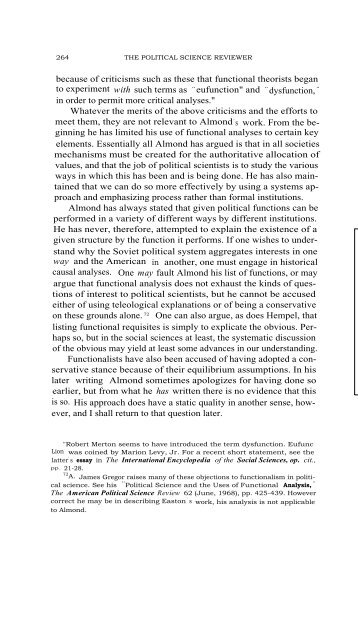FUNCTIONALISM AND ITS CRITICS - Intercollegiate Studies Institute
FUNCTIONALISM AND ITS CRITICS - Intercollegiate Studies Institute
FUNCTIONALISM AND ITS CRITICS - Intercollegiate Studies Institute
Create successful ePaper yourself
Turn your PDF publications into a flip-book with our unique Google optimized e-Paper software.
264 THE POLITICAL SCIENCE REVIEWER<br />
because of criticisms such as these that functional theorists began<br />
to experiment with such terms as " eufunction" and " dysfunction, "<br />
in order to permit more critical analyses."<br />
Whatever the merits of the above criticisms and the efforts to<br />
meet them, they are not relevant to Almond ' s work. From the beginning<br />
he has limited his use of functional analyses to certain key<br />
elements. Essentially all Almond has argued is that in all societies<br />
mechanisms must be created for the authoritative allocation of<br />
values, and that the job of political scientists is to study the various<br />
ways in which this has been and is being done. He has also maintained<br />
that we can do so more effectively by using a systems approach<br />
and emphasizing process rather than formal institutions.<br />
Almond has always stated that given political functions can be<br />
performed in a variety of different ways by different institutions.<br />
He has never, therefore, attempted to explain the existence of a<br />
given structure by the function it performs. If one wishes to understand<br />
why the Soviet political system aggregates interests in one<br />
way and the American in another, one must engage in historical<br />
causal analyses. One may fault Almond his list of functions, or may<br />
argue that functional analysis does not exhaust the kinds of questions<br />
of interest to political scientists, but he cannot be accused<br />
either of using teleological explanations or of being a conservative<br />
on these grounds alone. 72 One can also argue, as does Hempel, that<br />
listing functional requisites is simply to explicate the obvious. Perhaps<br />
so, but in the social sciences at least, the systematic discussion<br />
of the obvious may yield at least some advances in our understanding.<br />
Functionalists have also been accused of having adopted a conservative<br />
stance because of their equilibrium assumptions. In his<br />
later writing Almond sometimes apologizes for having done so<br />
earlier, but from what he has written there is no evidence that this<br />
is so. His approach does have a static quality in another sense, however,<br />
and I shall return to that question later.<br />
"Robert Merton seems to have introduced the term dysfunction. Eufunc<br />
Lion was coined by Marion Levy, Jr. For a recent short statement, see the<br />
latter ' s essay in The International Encyclopedia of the Social Sciences, op. cit.,<br />
pp . 21-28.<br />
72 A. James Gregor raises many of these objections to functionalism in political<br />
science. See his " Political Science and the Uses of Functional Analysis, "<br />
The American Political Science Review 62 (June, 1968), pp. 425-439. However<br />
correct he may be in describing Easton ' s work, his analysis is not applicable<br />
to Almond.
















